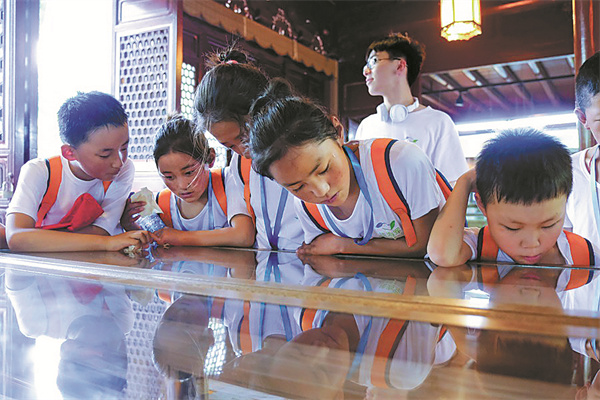

With black roof tiles and a wooden structure, Tianyi Pavilion, or Tianyige, the oldest existing private library in China, is surrounded by lush forests and delicate gardens in Ningbo, East China's Zhejiang province.
Walking into the Tianyige Museum, with the pavilion at its core, visitors can immediately feel the unique architectural style and charm of ancient China.
Nausicaa Giavarra, a drama teacher from Italy, moved to Ningbo with her husband in 2009 and is teaching drama lessons at a local international school.
Having lived in Ningbo for 14 years, she often takes her visiting friends to Tianyige Museum, as it is a peaceful place that is perfect for walking and chatting.
Tianyi Pavilion was built between 1561 and 1566 by Fan Qin, a politician of the Ming Dynasty (1368-1644), after he finished his nearly 30-year career in government and returned to his hometown. The pavilion was built to house the books Fan had collected throughout his life when he worked and traveled around China.
Giavarra says she loves the classical architectural style of Tianyi Pavilion, and adds that walking in the courtyard and the bamboo grove relaxes her mind.
Sometimes, she brings her children to Tianyige Museum to feed the fish in the pond, or brings a book and whiles away the afternoon, reading quietly on a stone bench.
Giavarra grew up in a family full of books. "My family's bookshelves extend from the floor to the ceiling, and the entire wall is filled with books. Perhaps this is why I became a drama person," she says.
Talking about the history of Tianyi Pavilion, she says she heard from the locals that many generations of the Fan family have been guarding the books in the pavilion. Their reverence for culture, especially their original intention to protect cultural heritage in difficult times, deeply moved her.
What made her really proud is that, in addition to Tianyi Pavilion, the other two most ancient surviving private libraries in the world, namely the Biblioteca Medicea Laurenziana and the Biblioteca Malatestiana, are both located in Italy.
Last year, Giavarra was lucky enough to witness the ceremony marking the cooperation between the three libraries.
Tianyi Pavilion has been communicating with the Biblioteca Medicea Laurenziana in preparation for a dialogue on book restorers in mid-May and is also connecting with the Biblioteca Malatestiana for an exchange on the "digital application of ancient books" later this year.
"I am very pleased that Ningbo has such a deep cultural connection with Italy. I hope and believe that China and Italy will have more opportunities for communication and cultural exchanges in the future. As someone involved with drama, I hope that art can become a way for China and Italy to interact in the future," Giavarra says.